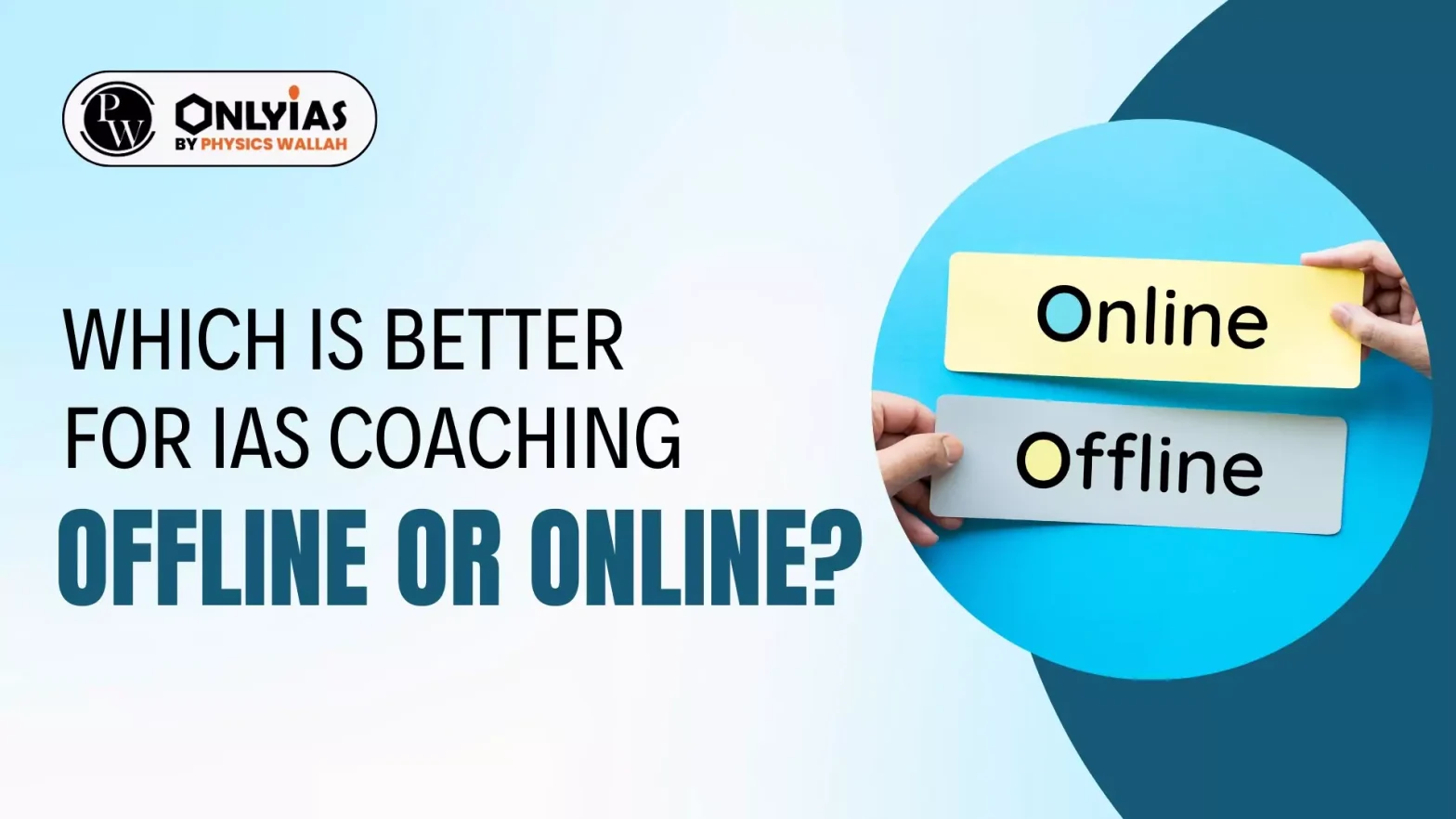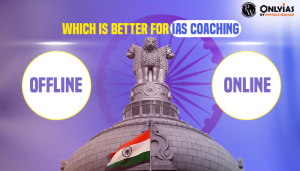

IAS (Indian Administrative Service) is one of the most prestigious and sought-after exams in India. Every year, lakhs of students prepare for this exam to get into the elite service of the country. IAS aspirants often get confused about whether to choose offline or IAS online coaching for their preparation. Both modes of coaching have their own advantages and disadvantages. In this blog post, we will discuss the pros and cons of offline and online coaching for IAS preparation.
Offline coaching has been the traditional mode of preparation for IAS aspirants. In offline coaching, students attend classroom lectures and interact with their teachers and peers on a regular basis. Let’s take a look at the advantages and disadvantages of offline coaching.
Offline coaching provides a classroom environment where students can interact with their teachers and peers face-to-face. This helps in better understanding of the concepts and clearing doubts on the spot. Classroom lectures also help in keeping students motivated and focused.
In offline coaching, teachers can provide personal attention to each student and identify their strengths and weaknesses. This helps in customizing the study plan and providing individual guidance to each student.
Offline coaching institutes provide structured study material and test series to their students. This helps in keeping the students on track and ensuring that they cover the entire syllabus in a timely manner.
Offline coaching requires students to attend classes in person, which takes up a lot of time and involves travel. This can be a major disadvantage for students who live far away from the coaching institute or have other commitments.
Offline coaching is generally more expensive than online coaching. The cost of tuition fees, study material, and travel expenses can add up to a significant amount.
Offline coaching institutes are limited in number and may not be available in all parts of the country. This can be a major disadvantage for students who live in remote areas or small towns.
Online IAS coaching has gained popularity in recent years due to the widespread availability of high-speed internet and the convenience it offers. In online coaching, students attend virtual classes and interact with their teachers and peers through online platforms. Let’s take a look at the advantages and disadvantages of online coaching.
Online coaching provides the convenience of attending classes from anywhere and at any time. This is a major advantage for students who have other commitments or live far away from coaching institutes.
Online coaching is generally more cost-effective than offline coaching. The cost of tuition fees and study material is lower, and there are no travel expenses involved.
Online coaching provides a wide range of options to choose from. Students can choose from a variety of coaching institutes and teachers from all over the country.
Online coaching lacks the personal interaction between teachers and students that offline coaching provides. This can be a major disadvantage for students who need individual guidance and support.
Online coaching requires a stable internet connection and a computer or mobile device. Technical issues such as slow internet speed and device malfunction can disrupt classes and affect the learning experience.
Online coaching requires students to be self-motivated and disciplined. This can be a major disadvantage for students who need constant motivation and guidance.
As technology continues to advance and online coaching becomes more popular, the future of IAS coaching may lie in a hybrid approach. Hybrid coaching combines the best of both worlds by offering a mix of online and offline coaching. Students can attend classroom lectures on a regular basis, but also have access to online study material and virtual classes. This approach provides the benefits of face-to-face interaction and personalized attention from teachers, as well as the convenience and cost-effectiveness of online coaching.
The hybrid coaching model also allows for greater flexibility and customization. Students can choose the mode of coaching that suits them best for each subject or topic. For example, they may prefer offline coaching for subjects that require more interaction and personalized attention, and online coaching for subjects that require more self-study and practice. The hybrid coaching model also allows for greater collaboration and sharing of resources between offline and online coaching institutes.
PW-Only IAS offers a new Foundation Batch for UPSC aspirants for the year 2024-2025. The batch includes 1000+ hours of interactive classes, 25+ Prelims Tests, 20+ Mains Tests, 10+ years experienced UPSC faculties, and daily practice (MCQs + Answer Writing). The focus of the batch is on building the base of GS concepts to prepare for UPSC Prelims and Mains. The classes will be conducted offline with daily 3+ hours of classes.
The faculty team has been selectively chosen to ensure that students take the lessons with them back to their homes. The batch also includes 20+ Mains Tests (Full Length Tests + Sectional Tests + Subject Completion Tests) and 25+ Prelims Tests (Full Length Tests + Sectional Tests + Subject Completion Tests + CSAT Tests). The pre-prepared and organized class notes cover all the missed points and ensure last-time revision. After enrollment, the classes will stay with the student in UPSC Prelims 2024 and in UPSC Mains 2024 too. Recorded lectures will be available within 48 hours, and if a student cannot attend the offline classes, they can watch the live classes online.
PW-OnlyIAS CTR Model is an innovative disruption in UPSC Classes. The model ensures concepts through classes and builds a habit that includes the continuous cycle of Revisions and Tests (Prelims & Mains). The Innovative CTR Model includes Lap 1: Memory Creator (Smart Revision), Lap 2: Smart-Sheet Tracker (Regular Test + Tracker), Lap 3: Get closer to Conceptual Clarity, and Lap 4: Doubt Solver Mitra. The model is divided into small sections of plans, and the whole week is rigorously planned and prepared into a schedule divided into Monday-Saturday Laps and Sunday Laps.
The model includes other exam-ready features like Personalized Mentor Assistance, Daily Class Notes PDF, Retd. Bureaucrat Regular Interactions, Peer Learning Sessions, Picked and Packed Exam-Resources, UPSC-Essentials Kit, Highly Researched material, and Extra. The batch also includes a CSAT Module for the extra care that the CSAT deserves as per the recent increased difficulty level of the CSAT Paper.
PW-Only IAS intends to take students out of the ineffective traditional way of preparation and make UPSC preparation a model that will actually ensure and secure the real learning of UPSC CSE preparation. The determining tools of PW-Only IAS are updated material, a proper mechanism to track every aspirant’s actual progress, personalized support, concept enrichment, ensured revision, and energetic and updated pedagogical methods as per current generation’s communication requisites.
The Foundation batch is available both in English and Hindi medium, and the fee details can be found on the website. Early bird offers are available for the first 1000 UPSC aspirants.
Choosing the right coaching institute is a critical decision for IAS aspirants. Here are some tips to help you choose the right coaching institute:
Research the coaching institutes in your area and read reviews from past students. Look for institutes with a good track record of success and experienced teachers.
Check the course content and study material provided by the coaching institute. Make sure it covers the entire syllabus and is up-to-date with the latest exam pattern.
Evaluate the teaching methodology of the coaching institute. Look for institutes that provide personalized attention and individual guidance to each student.
Visit the coaching institute and evaluate the infrastructure. Check if the institute has well-equipped classrooms, a library, and other facilities.
Check the success rate of the coaching institute in previous years. Look for institutes with a high success rate and a good reputation in the market.
Choosing the right coaching institute can make a big difference in your IAS preparation. By following these tips, you can make an informed decision and increase your chances of success in the exam.
Both offline and online coaching have their own advantages and disadvantages. It ultimately depends on the individual student’s preferences and circumstances. Students who prefer face-to-face interaction and personalized guidance may opt for offline coaching, while students who value convenience and cost-effectiveness may prefer online coaching. It is important for students to carefully evaluate their options and choose the mode of coaching that best suits their needs.
In conclusion, it is important for IAS aspirants to choose the mode of coaching that suits them the best. Offline coaching provides face-to-face interaction with teachers and peers, personalized attention from teachers, and structured study material. However, it also involves time and travel, high costs, and limited options. On the other hand, online coaching provides convenience, cost-effectiveness, and a wide range of options. However, it lacks personal interaction, requires a stable internet connection, and requires self-motivation. Students should carefully evaluate their options and make an informed decision to achieve success in the IAS exam.
The duration of an IAS coaching program can vary depending on the coaching institute and the course structure. Some coaching programs may last for a few months, while others may last for a year or more. Generally, a coaching program of 6-12 months is sufficient for IAS preparation.
Yes, it is possible to prepare for the IAS exam without coaching. However, coaching can provide guidance, study material, and test series that can help in better preparation and increase the chances of success in the exam.
The success rate of IAS coaching can vary depending on the coaching institute and the quality of coaching provided. However, on average, the success rate of IAS coaching is around 25-30%.
The cost of IAS coaching can vary depending on the coaching institute and the course structure. Generally, offline coaching is more expensive than online coaching. The cost of tuition fees, study material, and travel expenses can add up to a significant amount.
There is no specific eligibility criteria for IAS coaching. However, to appear for the IAS exam, candidates must have a bachelor’s degree from a recognized university and be between 21 and 32 years of age. Some coaching institutes may also have their own eligibility criteria.
These are some of the commonly asked questions about IAS coaching. It is important for IAS aspirants to choose the mode of coaching that suits them best and evaluate their options carefully to achieve success in the exam.
PW only IAS is considered the best IAS online coaching center in India. With experienced teachers who provide personalized attention and guidance to each student, the institute offers a wide range of courses and study materials to choose from. They also offer regular mock tests and feedback sessions to help students evaluate their progress and identify areas for improvement. In addition to their high-quality coaching, PW only IAS also provides excellent student support. They have a dedicated team of support staff who are available round the clock to assist students with any queries or issues they may have. Overall, PW only IAS is a great option for IAS aspirants who prefer online coaching.
<div class="new-fform">
</div>